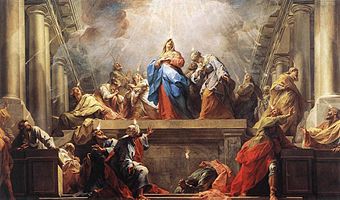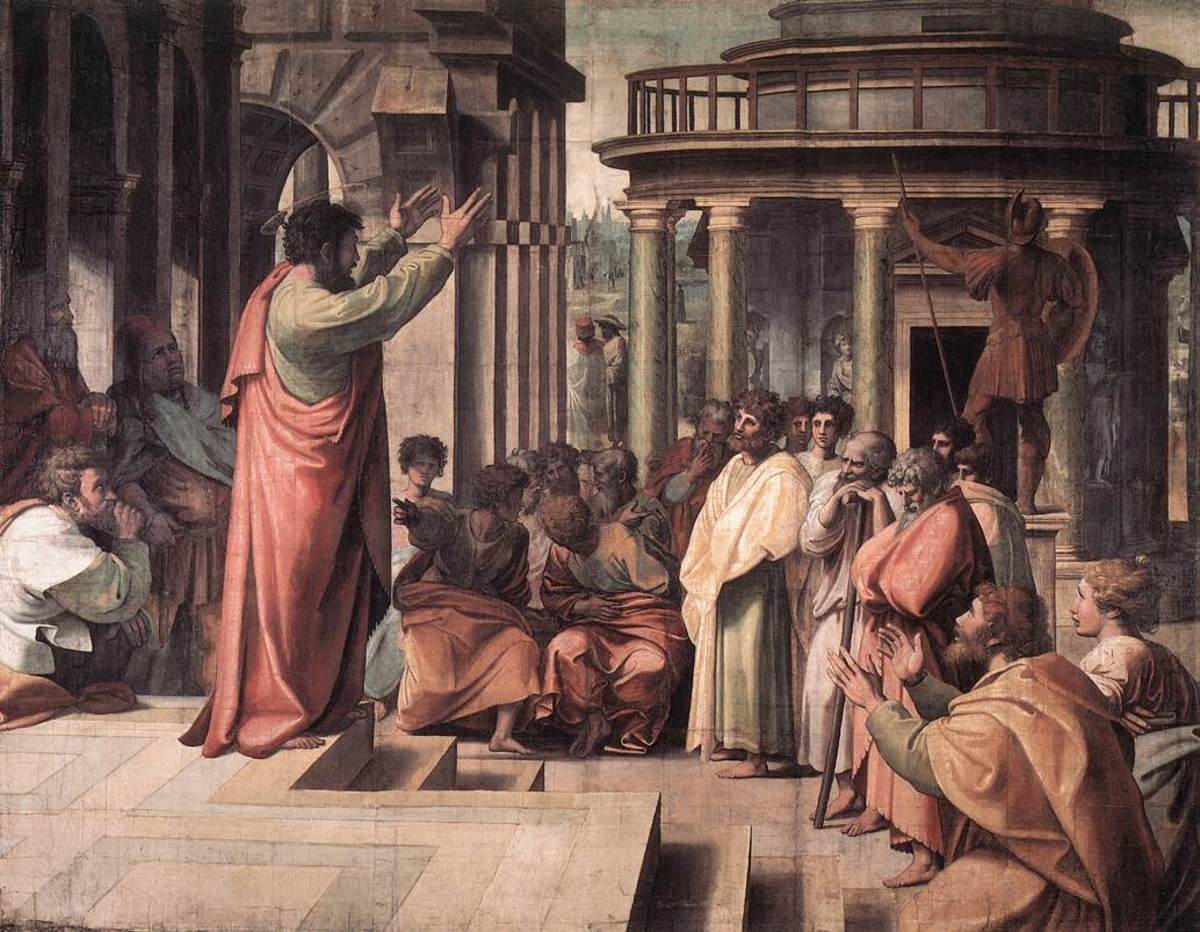Bible: What Does 1 Corinthians 12-13 Teach Us About "Grace Gifts"?
The Apostle Paul

The Site Where the Church Meets for Worship

Sign Gifts for Today?
Do you believe God is still giving the sign gifts today?
The Day of Pentecost and the First Baptism with the Spirit

Pneumatikon
The apostle prefaces his remarks about spiritual gifts—literally, “spirituals” (pneumatikon)—by stating his desire that the Corinthians not remain uninformed concerning this subject (v. 1; cf. Ryrie, who neatly summarizes the essence of the next three chapters on spiritual gifts) [New Testament Study Bible, 304].
[NASB’s editors supply a few words to verse two that are not in the original manuscript (“when you were . . . you were”), making the verse read more coherently than it does in the NKJV.]
Paul points out that someone led the Corinthians to worship dumb idols when they were pagan Gentiles (v. 2).
Then he reveals to them what does and what does not manifest the sure test for true spirituality: namely, if a teacher anathematizes Jesus, he does not speak from the Holy Spirit.
Only the one who possesses the Holy Spirit can confess the Lordship of Christ (v. 3).
[Apparently, those who led them astray to idols did the former.]
Having already mentioned the Holy Spirit and Christ Jesus, Paul subsequently provides a mini-summary of the involvement of each Person of the Trinity in the administration of spiritual gifts (vv. 4-6).
The Holy Spirit distributes various kinds of abilities (charismaton) (v. 4); the Son (the Lord) enables their use in different kinds of service (v. 5); and the Father (God) provides power for all the effects of these spiritual activities (v. 6).
[Word studies on “ministries” and “activities” would clarify the meaning here.]
Paul asserts that God gives believers the Spirit, so that the entire body of Christ would benefit from the various abilities He supplies (v. 7).
Verses eight through ten list nine spiritual gifts that Paul states the Spirit sovereignly parcels out to individual believers (v. 11).
Ryrie again briefly summarizes the substance of these abilities, abilities he believes “were necessary before the Word of God was written” (305).
[Pentecostals believe that God continues to give these gifts today.]
The apostle spends the rest of chapter twelve discussing unity and diversity within the Church, comparing the human body to the body of Christ (vv. 12-31).
Each body has many parts, but each is also a unit (v. 12).
God treats each nationality and social status equally in Christ’s body; He has joined every member to Christ and to each other through the baptizing ministry of the Holy Spirit, Whom each believer has also “drunk” (appropriated; experienced) [v. 13].
[One is "immersed" or placed into the body of Christ, the Church, when one trusts Jesus as one's Lord and Savior.
The baptism of the Spirit is not an experience.]
On the one hand, Paul first stresses the body’s diversity—the fact that it is composed of many members, not just one (v. 14).
Each member—foot, eye, hand, ear, or whatever—plays a vital role, performing a necessary function (vv. 15-17), for God has situated all members where He wants them (v. 18).
The body would obviously not exist if all that existed were one member (v. 19).
On the other hand, Paul notes that the body’s unity is just as important to recognize as is its diversity (v. 20).
As in the human body so also in Christ’s, no member can exclude any other from exercising its function, since even those parts some think unnecessary or weaker than others are, in fact, vital (vv. 21-22).
People adorn parts of their body deemed “less honorable” and “unpresentable” with more clothing (v. 23).
In order to prevent divisions in the body, God honors the weaker members by using the stronger ones to care for them (vv. 24-25).
Each member empathizes with those who hurt, and rejoices with those who receive honors (v. 26).
“You Corinthians,” Paul concludes, “are a unit (the body of Christ) and individual members of that body” (v. 27).
Apostles: Witnesses of the Resurrection of Jesus

The Most Valuable Spiritual Gift
view quiz statisticsReturning to the topic of spiritual gifts, the apostle lists eight abilities in order of honor (v. 28), the first three standing apart from the rest:
(1) apostles (those divinely sent witnesses of the Resurrection and ambassadors of the gospel);
(2) prophets (foretellers of future events and preachers); and
(3) teachers (expositors of doctrine).
Those who work miracles (people able to perform supernatural acts of divine power) come fourth.
(5) Healers (believers who can restore physical health miraculously),
(6) helpers (those who willingly lend a hand wherever it is needed),
(7) administrators (managers of church ministries), and
(8) tongues (those able to speak in real foreign languages unknown to the speakers) conclude the list.
Paul asks several rhetorical questions to drive home the truth that everyone does not have the same gift; in other words, to each individual belongs his own ability (vv. 29-30).
However, he does urge them to desire to have the best or greater gifts (v. 31a).
[Does he refer to the first three listed above, or any of those above?
People will learn if the Spirit has gifted them in certain ways only through experimentation.]
The apostle then quickly transitions into “the love chapter,” in which he proposes to show the Corinthian believers “a more excellent way” to live than through merely exercising gifts (v. 31b).
John MacArthur
I Corinthians 13
Paul first argues for the primacy of demonstrating love over ministering in “tongues”; without exercising the former attitude (love), one’s use of the latter spiritual gift (tongues) will sound like pagan worship.
That display will certainly not please God (v. 1).
Second, having the ability to predict the future, amass abstruse knowledge and wisdom, and exercise faith strong enough to remove gigantic obstacles thwarting one’s success without first showing God’s agape (unselfish, divine love that operates without thought of any return from its recipients) amounts to nothing in the Lord’s sight (v. 2).
Third, people who dispense with all their worldly goods to feed and clothe the poor, and who willingly sacrifice their lives as martyrs for Christ will not profit (spiritually, eternally) from their actions unless they mix love with their altruism and dedication to a cause (v. 3).
The apostle next lists a weighty description of love’s marvelous characteristics (vv. 4-8a).
First, agape patiently puts up with people’s varied expressions of sinfulness by not criticizing them cuttingly (v. 4a).
Second, love does not look hatefully upon an individual gifted with superior abilities (v. 4b).
Third, it does not put itself on display for others to see and admire, and it does not boast about what it has (v. 4c).
Fourth, God’s love does not treat others with disdain, putting them down disrespectfully (v. 5a).
Fifth, it does not greedily work to satisfy its own desires at the expense of others (v. 5b).
Sixth, it does not react unadvisedly to personal attacks (v. 5c).
Seventh, love does not devise plans of revenge (v. 5d).
Eighth, it is not pleased when evil progresses; however, it exults when a believer propounds the truth and prevails (v. 6).
Ninth, love has an immense ability to put up with life’s trials and to remain under the burdens (v. 7a, d).
Tenth, it continually sustains belief in God and waits upon His timing (v. 7b, c).
Eleventh, agape never fails to accomplish God’s purpose (v. 8a).
The capacity of prophecies, tongues, and knowledge to endure pales by comparison to God’s love (v. 8b-d).
Mankind’s knowledge of this present multi-faceted existence and the future, partial and temporary as it is, will cease to exist when Christ, the Perfect God-Man, ushers in the eternal state (vv. 9-10).
[Some commentators refer to this “complete” thing as the Scriptures; true as that assertion is, it is better in this context to construe this “perfect” as Christ’s eternal kingdom.]
Paul draws an analogy from his own experience of life.
As a child, he spoke, understood, and thought as a child; as an adult, he naturally reasons with more maturity (v. 11).
Likewise, the Christian’s present knowledge as a spiritual child will pale in comparison with his future knowledge of God and of life as a spiritual man when Christ sets up the eternal state.
Darkened by sin, the believer’s understanding of life now dimly reflects reality.
However, when the Lord opens up eternity to him, that understanding will increase exponentially.
A greater fullness of the knowledge of God will replace the Christian’s present, partial understanding (v. 12).
Paul concludes his exposition by stating concisely that three Christian virtues—faith, hope, and love—will endure during this life after the “spectacular” gifts have ceased.
Love surpasses the other two virtues in terms of importance and value. When Christ appears the second time, the Christian’s faith and hope will be complete. Love, however, will endure forever (v. 13).
© 2013 glynch1








